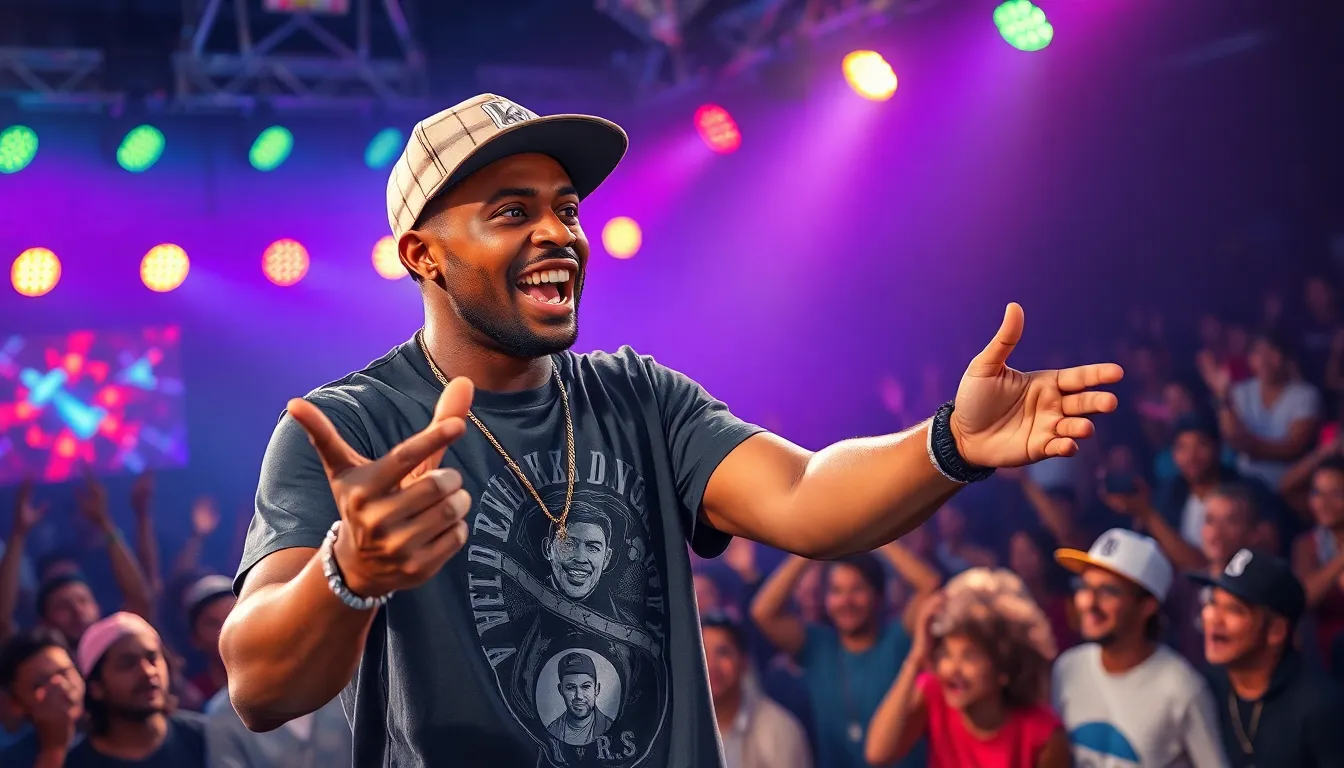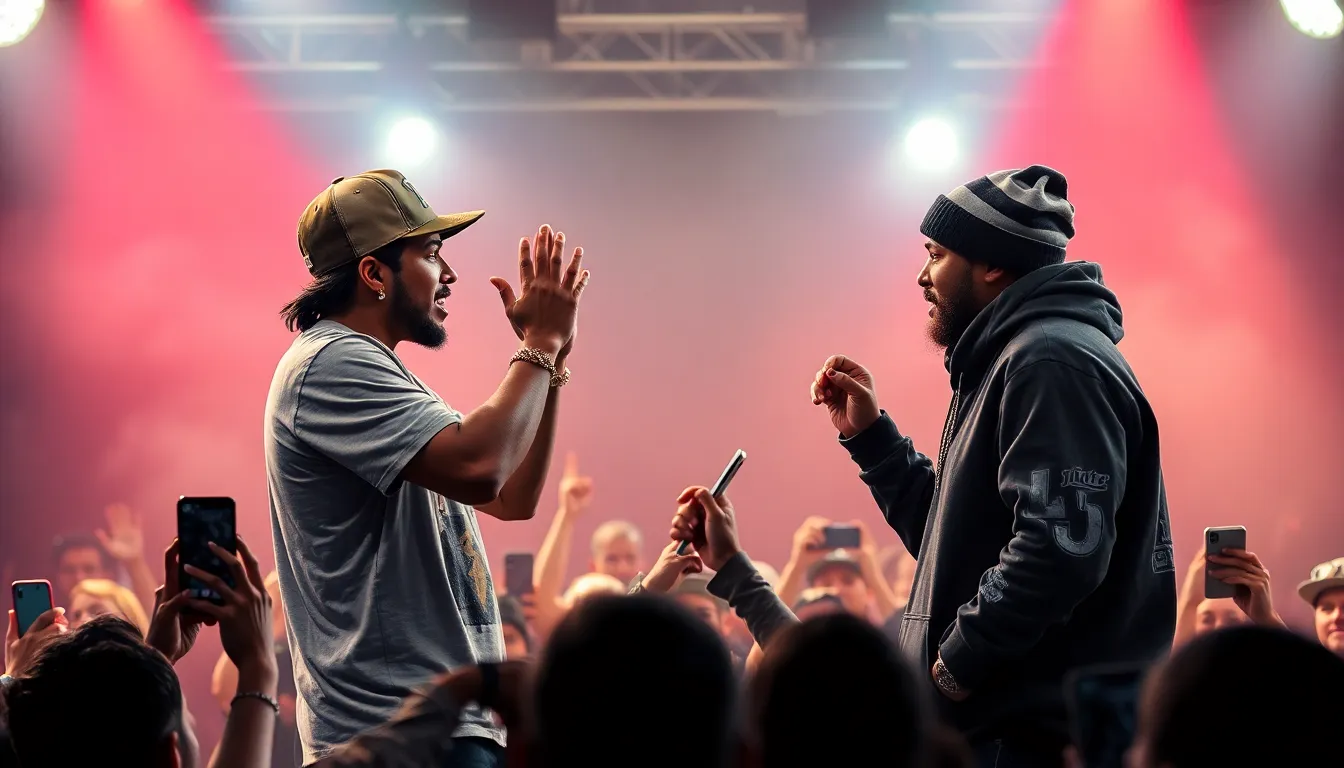Table of Contents
ToggleRap battles are more than just lyrical sparring; they’re a cultural phenomenon that showcases creativity, wit, and sometimes, downright savage comebacks. Picture two titans of the mic trading bars, each line sharper than a chef’s knife in a culinary showdown. These iconic moments not only entertain but also push the boundaries of artistry in hip-hop.
From epic showdowns that left audiences gasping to legendary rivalries that shaped the genre, rap battles have a way of capturing the essence of competition and camaraderie. Whether it’s a classic throwback or a modern clash, each battle tells a story that resonates with fans. So, buckle up as we dive into the unforgettable world of iconic rap battles that have left their mark on music history.
Overview of Iconic Rap Battles
Iconic rap battles showcase the creativity and competitiveness inherent in hip-hop culture. These battles often serve as platforms for intense lyrical exchange, where artists demonstrate their verbal dexterity and clever wordplay. Key moments in these contests define careers and influence the genre’s evolution.
Memorable showdowns shape public perception and audience engagement. For example, the legendary rivalry between Nas and Jay-Z exemplifies how diss tracks can elevate artistry while captivating listeners. Another notable clash occurred between Eminem and Machine Gun Kelly, illustrating how fresh perspectives invigorate hip-hop.
Rap battles not only entertain but also create cultural conversations. They often reflect societal issues, addressing themes such as resilience, identity, and authenticity. Artists use these battles as opportunities to connect with their audiences on a deeper level.
The lyrical duels foster a sense of community among fans and artists alike. Many historical battles inspire new talent, highlighting the importance of these exchanges in nurturing future leaders in rap. In countless cases, the aftermath often leads to collaborations, expanding artistic possibilities.
Events like BET’s Hip-Hop Awards freestyle cyphers further amplify this art form. These staged competitions heighten the excitement, showcasing both established and emerging talent. Overall, iconic rap battles remain a vital and evolving part of hip-hop’s rich history, marking significant moments that resonate across generations.
Key Elements of Epic Rap Battles

Epic rap battles showcase essential elements that elevate performance and engage audiences. Two crucial aspects are lyricism and delivery, both of which significantly influence the impact of a rap battle.
Lyricism and Wordplay
Lyrical prowess defines iconic rap battles. Complex rhymes and clever wordplay engage listeners and keep them invested. Artists often incorporate metaphors, similes, and double entendres into their verses. These techniques enhance creativity and elevate the battle’s intensity. Frequent references to culture, politics, and personal experiences resonate with audiences. Such relevance encourages connection and deepens the emotional impact. Iconic examples, like Eminem’s intricate lyrics, demonstrate how well-crafted lines can dominate a rap battle’s narrative.
Performance and Delivery
Performance excellence plays a pivotal role in rap battles. Vocal delivery, timing, and stage presence captivate the crowd and create an electric atmosphere. Artists focus on rhythm and cadence, ensuring their flow complements the beat. Engaging physical gestures and facial expressions enhance the overall experience. Audience interaction also becomes vital, as connecting with fans amplifies the energy of the moment. Memorable performances from figures like Lil Wayne reveal how charisma and passion can turn a rap battle into an unforgettable spectacle.
Notable Iconic Rap Battles
Iconic rap battles serve as defining moments within hip-hop culture. They highlight not only lyrical skill but also the personal stakes for the artists involved.
Battle 1: Description and Impact
The clash between Nas and Jay-Z remains legendary. Their feud, characterized by sharp lyrics and personal jabs, defined a generation of hip-hop in the early 2000s. Nas’s “Ether” challenged Jay-Z’s dominance, showcasing lyrical depth and emotional intensity. The fallout influenced countless artists and sparked discussions about authenticity and rivalry in hip-hop. This battle not only boosted sales for both artists but also solidified their legacies. Fans still reference this legendary showdown when discussing rap battles.
Battle 2: Description and Impact
Eminem and Machine Gun Kelly’s confrontation captured widespread attention. Their lyrical exchange included Eminem’s “Killshot” and Kelly’s “Rap Devil,” both laden with biting insults and clever wordplay. This battle highlighted the generational divide within hip-hop, with both artists bringing their unique styles to the forefront. The impact reverberated through social media platforms, generating millions of views. As a result, this feud reignited interest in rap battles among younger audiences. MGK’s shift to pop-punk illustrates the diverse pathways stemming from these rivalries.
Battle 3: Description and Impact
Lil Wayne’s lyrical duel with Pusha T engages fans on multiple levels. The rivalry initiated with tracks like “Mr. Me Too” and continued through various diss tracks. Pusha T’s sharp critiques of Wayne’s artistry and commercial success challenged him deeply. The battle sparked conversations about loyalty, artistry, and authenticity in the industry. Significant responses from both artists kept audiences intrigued and eager for more. This exchange showcased how personal conflicts can elevate an artist’s relevance, ultimately deepening their relationship with fans and fellow artists.
Cultural Significance of Iconic Rap Battles
Iconic rap battles significantly impact culture, showcasing creativity and fierce competition. Rap battles serve as platforms for artistic expression, pushing boundaries within hip-hop. Artists like Nas and Jay-Z exemplify this rivalry, challenging one another in a way that reshapes careers and influences the genre.
Themes explored in these battles often reflect societal issues. Identity, authenticity, and resilience highlight the struggles and triumphs of artists, resonating with audiences. Eminem and Machine Gun Kelly’s clash reignited interest in rap battles, appealing to younger listeners while illustrating a generational divide in hip-hop.
Events such as BET’s Hip-Hop Awards freestyle cyphers amplify the role of rap battles in community-building. Such gatherings highlight the talent of both established and emerging artists. Fans connect through these performances, fostering a sense of belonging within the hip-hop culture.
Key elements elevate rap battles beyond mere competition. Lyrical prowess elevates engagement, as complex rhymes and clever wordplay captivate listeners. Artists reference culture and politics, drawing deeper connections with their audience. Moreover, performance excellence plays a crucial role; timing and stage presence create an electric atmosphere.
Memorable performances enhance the overall experience, with physical gestures and audience interaction boosting energy. Lil Wayne exemplifies this engagement style in his standout performances. Iconic battles function as defining moments, inspiring new talent and collaborations while ensuring rap continues to evolve.
Rap battles thrive in hip-hop’s rich history, marking significant cultural moments that resonate across generations. These lyrical contests remain integral to the genre, shaping public perception and artist identities alike.
Iconic rap battles serve as a powerful testament to the artistry and competitive spirit within hip-hop. They not only highlight individual talent but also reflect broader cultural narratives that resonate with audiences. These lyrical showdowns create lasting legacies for artists while fostering community and inspiring future generations. As rap continues to evolve, the essence of these battles remains a cornerstone of the genre, ensuring that the art form thrives and adapts. The impact of these moments will echo through time, reminding fans and artists alike of the dynamic nature of hip-hop culture.




